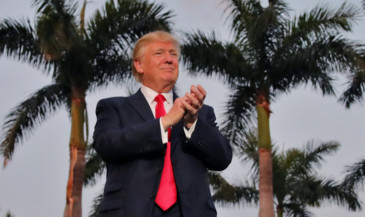
The US president hogged the headlines with an outburst at Australian Prime Minister Malcolm Turnbull, his sabre-rattling at Iran and warnings to China
The New York Times called it insult diplomacy, referring to his angry telephone conversation with Turnbull on resettling refugees in Australia’s offshore prisons.
“Diplomats and foreign policy professionals were still reeling from that revelation when the first accounts of the call with Prime Minister Malcolm Turnbull of Australia trickled in. Fuming about an agreement the Obama administration and Turnbull had reached to resettle refugees stranded in offshore prisons run by Australia, Trump went ballistic. The American president reportedly hung up on Turnbull after declaring that ‘this was the worst call by far’ with a foreign leader that day. There was no apology or backtracking the next day to mend fences with an ally that has obediently followed the United States into its recent military quagmires in Iraq and Afghanistan and remains an important intelligence-sharing partner,” the paper said in an editorial. “If this bellicose approach becomes the norm, alliances and key relationships will quickly fray, and the appeal of anti-American politicians is certain to grow. When the time comes, as it assuredly will, for Trump to pick up the phone to make tough requests of traditional allies in moments of crisis, he shouldn’t be surprised if it is the person at the other end of the line who ends the call abruptly,” the paper said.
The Sydney Morning Herald said the tension is bad for regional security and Australia’s place in the world. But the paper was quick to point out that Trump’s outburst is unlikely to imperil the relationship between the two countries. “The relationship is bigger than the sum of individual deals. Each party needs the other. Yes, the pendulum swings according to the geopolitical climate and domestic politics. Yes, Trump has been too aggressive this time. But his administration quickly moved to reassure Australian ambassador Joe Hockey,” the paper said in an editorial. “Canberra will need to plan for his known unknown approach to trade, security and America’s allies. Unfortunately, there’s no planning for any unknown unknowns that Trump and his swamp-draining team might have in mind,” the Australian paper said.
The Los Angeles Times came down heavily on National Security Adviser Michael Flynn’s announcement putting Iran on notice, following its missile launch. “It’s telling that Flynn’s statement came just before the Senate approved former ExxonMobil CEO Rex Tillerson as Secretary of State. So having ousted top career diplomats at Foggy Bottom, Trump pushed toward a potential international crisis before he even had his own diplomatic team in place,” the paper said in an editorial.
“For the sake of the nation, we hope Trump quickly readjusts his approach to international affairs from what seems to be a threaten-first framework to one that relies on diplomacy. He must remember that other nations have their own interests, and an insult or ill-considered threat can lead to more than a headline-generating spat. “This is a dangerous game. And it’s unclear that Trump or Flynn even know how to play it,” the paper said.
The South China Morning Post warned that Trump is playing with fire, adding that the Americans are needlessly raising tensions over the South China Sea dispute where US interests are not even clear. “The manner in which they have referred to the contested waters shows a lack of understanding and highlights the need for a coherent policy, the paper said in an editorial. “China has told Trump to stay out of the dispute. It has reiterated its dedication to freedom of navigation and desire for talks with nations directly involved to ensure a peaceful resolution. But the US administration has only shown a desire to be provocative; it has signalled an intention to go head-to-head with Beijing on a range of issues, Taiwan and trade among them.
“The US has yet to articulate what interests it needs to defend and how a territorial dispute it has no part in is a factor. Whatever they may be, threats and military confrontation are not the way to handle the issue,” the Hong Kong-based paper said.




_resources1_16a31069e4e_small.jpg)







